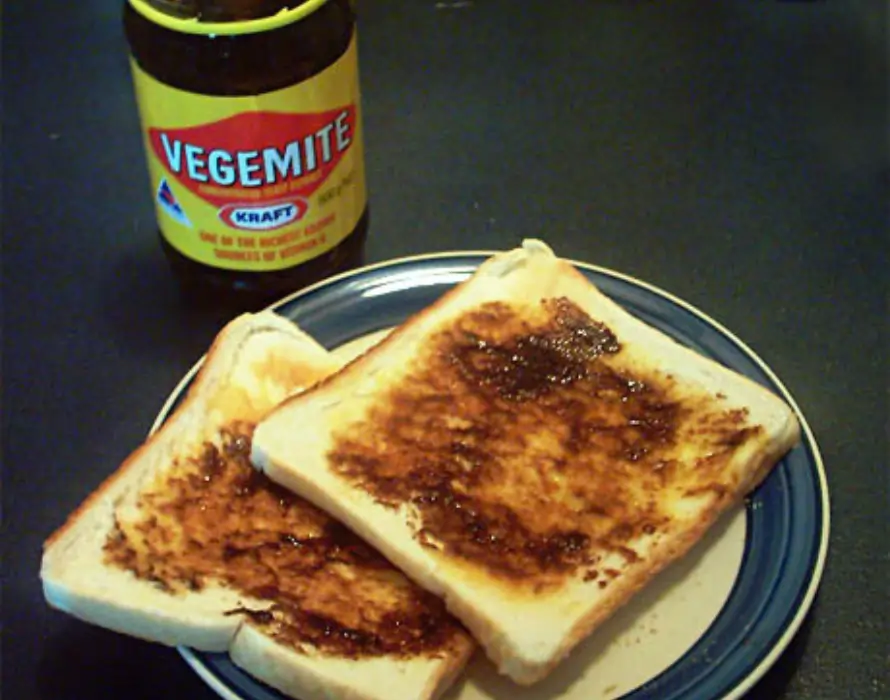Introducing Vegemite to toddlers concerns many parents, particularly because of its high sodium content but also its rich B vitamin profile.
Is it safe?
How much can a toddler eat without exceeding their daily sodium limit?
This article breaks down the nutritional facts and provides precise recommendations for incorporating Vegemite into a toddler’s diet.
Table of Contents
What is Vegemite?
Origins and Composition
Vegemite is a dark, savory spread made from brewer’s yeast extract, salt, and added B vitamins. It has been a staple in Australian households for over 100 years. The key nutrients in Vegemite include:
- Yeast extract (rich in glutamates, which give it an umami flavor)
- Salt (preserves the product and enhances taste)
- B vitamins (thiamine, riboflavin, niacin, and folate)
Because of its strong taste and high sodium content, Vegemite should be introduced cautiously to young children.
Nutritional Profile of Vegemite (For Toddlers)
B Vitamins in Vegemite (Per 1 Teaspoon – 5g Serving)
| Nutrient | Amount in Vegemite (5g) | Daily Requirement for 1-3 Year-Olds | % of Toddler’s Daily Need |
|---|---|---|---|
| Thiamine (B1) | 0.55 mg | 0.5 mg | 110% |
| Riboflavin (B2) | 0.43 mg | 0.5 mg | 86% |
| Niacin (B3) | 2.5 mg | 6 mg | 42% |
| Folate (B9) | 100 mcg | 150 mcg | 67% |
✅ Vegemite is an excellent source of B vitamins, helping with energy metabolism, brain function, and red blood cell production in toddlers.
Sodium Content: The Biggest Concern for Toddlers
How Much Sodium is in Vegemite?
One teaspoon (5g) of Vegemite contains 173 mg of sodium.
How Does This Compare to a Toddler’s Daily Sodium Limit?
The biggest concern with Vegemite is its high sodium content.
Here’s how it compares to a toddler’s daily sodium intake:
| Age Group | Recommended Daily Sodium Intake (mg) | Upper Limit (mg) (Reduce if Above) | Sodium in 1 Teaspoon of Vegemite (5g) | % of Daily Limit |
|---|---|---|---|---|
| 0–6 months | 110 mg | Not determined | 173 mg | Too high, not recommended |
| 7–12 months | 370 mg | Not determined | 173 mg | 46.75% (Too high) |
| 1–3 years | 800 mg | 1,200 mg | 173 mg | 21.6% |
| 4–8 years | 1,000 mg | 1,500 mg | 173 mg | 17.3% |
| 9–13 years | 1,200 mg | 1,800 mg | 173 mg | 14.4% |
🚨 One full teaspoon of Vegemite already provides over 21% of a one-year-old’s daily sodium limit!
💡 What This Means:
- Younger toddlers (under 2 years) should have less than ½ teaspoon per serving.
- Older toddlers (2-3 years) can have a small amount more, but still in moderation.
How Much Vegemite Should a Toddler Eat?
| Age | Serving Size (Max Per Day) | Safe Frequency |
|---|---|---|
| 6-12 months | ❌ Not Recommended | ❌ Avoid |
| 1-2 years | ¼ teaspoon (1.25g) thinly spread | 1-2 times per week |
| 2-3 years | ½ teaspoon (2.5g) thinly spread | 2-3 times per week |
💡 Key Guidelines:
✔️ Always spread Vegemite thinly—never thick like peanut butter.
✔️ Pair with low-sodium foods (e.g., whole grain toast, unsalted butter).
✔️ Monitor overall sodium intake—Vegemite is just one source.
How to Introduce Vegemite to Your Toddler
If you decide to introduce Vegemite:
- Start Small: Begin with a minimal amount to gauge your child’s acceptance.
- Monitor Reactions: Watch for any signs of allergies or sensitivities, especially if your child has known food intolerances.
- Combine Wisely: Pair Vegemite with low-sodium foods to balance overall sodium intake.
Healthier Alternatives to Vegemite for Toddlers
If you want lower-sodium alternatives that still provide B vitamins, consider these spreads:
| Alternative Spread | B Vitamins? | Sodium Content | Other Nutritional Benefits |
|---|---|---|---|
| Reduced-Salt Vegemite | Yes (B1, B2, B3, Folate) | 99 mg (1 tsp) | 40% less sodium but still needs moderation |
| Nutritional Yeast Spread | Yes (B1, B2, B3, B6, B12, Folate) | Low (<50 mg per serving) | High in protein, vegan-friendly |
| Fortified Peanut Butter | Yes (B3, B6, Folate) | Low (50-75 mg per tbsp) | High in protein and healthy fats |
| Tahini (Sesame Seed Paste) | Yes (B1, B6) | Low (<20 mg per tbsp) | Rich in calcium, iron, and healthy fats |
| Mashed Avocado | Minimal (B9 – Folate) | Very Low (<5 mg per tbsp) | Great for brain development, healthy fats |
💡 Best Alternative? Nutritional yeast spread offers B vitamins without high sodium, making it the closest match to Vegemite.
Conclusion: Should You Give Vegemite to a One-Year-Old?
✅ Yes, but in very small amounts due to its high sodium content.
🚫 Avoid it for babies under 12 months since their kidneys are still developing.
⚠️ Stick to a thin smear, 1-2 times a week, for toddlers aged 1-3 years.


